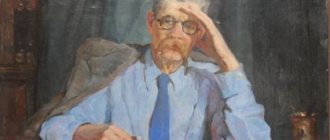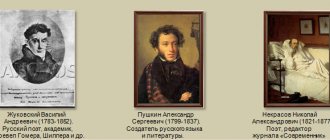Gorky wrote an excellent work, “At the Lower Depths,” which is still staged in theaters today, but the play was written more than a hundred years ago! But, sad as it may sound, today there are also people who drink themselves to death, places where the doomed are living out their last days. And now there are people broken by life, there are also those who console, give faith in themselves, even though it is fleeting. Until now, each of us asks the question what is needed for a person and his happiness: reality in truthful information, or consolation in lies?
“Man is the truth” - essay
Option 1
In a forest clearing, surrounded on all sides by soft green grass and tall, centuries-old pine trees, a white stone building rises. The rays of the gentle summer sun freely penetrate through the massive windows, flooding the marble floor with dazzling light, causing it to shimmer. Thin, regular-shaped columns, snow-white walls and a gilded dome dissolve this sunlight.
This is exactly the kind of hospital the actor saw in his dreams. An excellent hospital. Light, cleanliness, food, all for free. What is this. A truth that is impossible to believe, a golden dream or an unfulfilled dream. Each character in M. Gorky’s play “At the Lower Depths” sees this fairy tale and himself in it in his own way. However, being under the impression of their dreams, the characters do not understand each other: they argue over all sorts of trifles, swear, and insult other inhabitants of the shelter. Disputes about the truth continue until the very end of the work.
Man is designed in such a way that sometimes the truth is very bitter for him. We sometimes prefer to accept a “pleasant” lie rather than the bitter truth. "A! You can’t stand the truth!” Kvashnya shouts at Klesch.
The night shelters humiliate each other. This is manifested in their attitude towards others, in their speech. The inhabitants of the shelter do not understand that by causing pain to others, they first of all pollute their souls. Only Luke shows compassion and respect for others. He appears just at the moment when the shelters are arguing about honor and conscience. The name Luke means "bright". And, indeed, it seems to radiate light. With the arrival of Luke, the disputes turn into a conversation between the shelters and the wise old man. This kind wanderer respects all people without exception, his speech is worthy of a pious person, but his gaze is at times harsh and condemning.
Luke is absolutely honest with all the characters. Anna, Kleshch's wife, appears as a martyr in the play. “I’ve been trembling all my life. How can I not eat anything else.” “I’m dying, here.” And Luka consoles her: “Believe!” “The Lord will look at you meekly and say: I know this Anna! Well, he’ll say, take her, Anna, to heaven! Let him calm down. I know she lived a very difficult life. Very tired. Give Anna peace.” Is Luke lying? Of course not. According to the Christian religion, after life a person can go to heaven or hell. The wise old man, who seems strange and crafty to others, actually deceives no one. After all, you can’t call Luke godless. “Believe,” he repeats several times throughout the play. The elder gives an absolutely correct answer to Ash’s question whether there is a God. “If you believe, there is; Don’t believe me, no.” The Bible says that God “rests” in the soul of a believer. The unbeliever himself moves away from God. The Lord becomes unattainable for him.
Luka tells the truth to the Actor: “Get treatment! Nowadays there is a cure for drunkenness, hear! Treat for free, brother, this is the kind of hospital that was built for drunkards, so that you treat them for nothing. They recognize, you see, that a drunkard is also a human being and they are even glad when he wants to be treated!” Let us turn to the history of Russia: in many large cities, for example in Moscow, Kyiv, Kazan, already at the beginning of the twentieth century there were hospitals for drunkards, and treatment in many of them was free. So why then does Luke not name at least one of these cities? The wise old man gives the Actor hope and helps him temporarily turn away from the disastrous path. But the Actor turned out to be a weak man and allowed Satin’s opinion to triumph over his own. The Actor’s guiding star, which helped him go towards his dream, went out. The actor even stated with some degree of pride that his body was poisoned by alcohol. It is quite possible that he did not need to be treated; it was enough to imagine in his imagination the cherished hospital that he would someday be able to reach.
Luka is sincere in his conversation with Vaska Pepl when he invites the thief’s son to leave the shelter for Siberia and find a job. Is it true that it can be good in Siberia? Of course it's true. But not every person is able to find his place in life despite fate. Ash is, without a doubt, dexterous, cunning and even daring. The “golden side” is intended for such people. The old man believes that this is how it should be. We can't say he's lying. “And why do you really need it, think about it! She might be a dick for you"
Luke knows Siberia and therefore can give such advice. It is not the old man’s fault that Vaska Ash did not follow this advice, although he suggested that Natasha flee with him to Siberia.
The kind old man consoles Nastya: “I believe! Your truth, not theirs. If you believe that you had true love, that means you had it!” Bubnov believes that the old man is lying. Luke does not argue that the story is made up, but he does not deny what was said. The wise old man sees that true love lives in Nastya’s soul. But her love is special, a feeling experienced after insults and humiliation. Luka believes that Nastya is capable of love, and this is his truth.
For Kleshch, the truth is the desperate situation in which he finds himself, hopelessness. “That's the truth! You have no strength to work! There is no refuge! “You have to breathe out.” Luke says: “It’s true that because of a person’s illness, you can’t always heal a soul with the truth.” Perhaps the elder meant that living without the opportunity to change one’s fate is unbearable, a person cannot endure the bitter truth for too long . Sooner or later, the hope arises in his mind that someday he will find his place in life, his righteous land. But the search is difficult and requires patience. This land is not on any map, it can only be in the human soul. Luke sincerely believed in the existence of such a land, giving the night shelters a chance to find a purpose, the meaning of life. Maybe these were “fictions”, “fairy tales”, “deception”, but Luke spoke from the bottom of his heart, which means he did not lie.
Satin's monologue in the fourth act is eloquent. He does not understand that Luka never lied, but was sorry, sympathetic, telling only the truth. Even if he was wrong, he gave the night shelters a chance to make his words true. Luka understood that the inhabitants of the shelter were afraid of tomorrow, their present was gloomy, their future was alarming and dark. And as soon as the past no longer threatens them. The wise old man tried to transform the night shelters. And the fact that he failed to do this was primarily the fault of the night shelters themselves, who incited each other to doubt the truth of Luke’s words.
Each shelterer understands the truth in his own way and gives this word his own meaning.
They say truth is born in dispute. However, there are questions that man has not yet answered. Due to our imperfections, excessive self-love, and unwillingness to listen to the opinions of others, sometimes it is difficult for us to distinguish lies from the truth. It is difficult to discern a grain of truth behind a wide wall of general phrases. But when this is successful, new opportunities open up for a person, he begins to look for the meaning of life, to strive to know the truth.
The inscription “Man, know yourself” on the wall of an ancient temple is a repeated challenge to every soul. "Man - that's the truth!" And everyone who can realize this simple truth will gain confidence in their own abilities and find their golden dream.
Option 2
Gorky touched on the theme of man and truth in his play. In the work of a writer, we see a truth that is not the same for everyone. Each hero has his own and we can find confirmation of this in quotes. The characters talk about what is better: to accept life as it is or to hear a lie, which will create a certain illusion. Here we meet Satin. He believes that there is no need to deceive people and feel sorry for them.
There is reality, there are facts, and even if this reality is cruel, but facts are facts, what is there to hide. According to Satin, people should rely on themselves. His truth is that there is no point in pity. He says: What good will it do you if I take pity on you? There is a man, everything else is his creation. Bubnov’s truth is the oppression of inhumane circumstances. This is unbelief. He believes that everyone is born to die and there is no point in feeling sorry for each other. And we also meet Luka. He believes that distorting reality, embellishing reality with good intentions, is not only possible, but also necessary.
This is a kind of impetus to action, so he tells the drunkard about free treatment, Anna, who is dying, talks about life after death. He tried to support everyone, feel sorry for them and give them hope. Only Satinin says that lies are the religion of slaves. It is impossible to live with illusions, and lies themselves have never saved anyone. And as confirmation of this, we see the fate of the heroes. Speaking on the topic of Man and Truth, I would like to say that each hero of the work is true to his own view.
There is truth in everyone's truth, so it is very difficult to judge who is right and who is wrong. The only thing I can say is that I personally am in favor of us living in the real world, and not in an illusory one, because no matter how you look at it, we will still face reality, well, but we can embellish reality a little. But, only in the case of fueling a person for action or action, because it is not for nothing that they say that water does not flow under a lying stone.
In Gorky's play, this fuel was provided by Luka. But the heroes themselves did not have enough strength and enthusiasm to escape from the swamp and change their destiny. And is it possible to change something when people are in complete hopelessness, where there is no work, no housing, no strength. An inhumane society kills, and that’s why the ending of the heroes’ lives is so tragic.
This is interesting: You can write the essay “My Future” using the examples provided. This is an expression of one point of view on how I see my future
Two truths about a person in M. Gorky’s play “At the Depths” (essay)
Option 1
What is this world based on? Why, in the most bitter, seemingly hopeless moments of our lives, suddenly a person appears who resurrects us, giving us new hope and love? But there are cases when someone else’s pity, someone else’s compassion humiliate proud, independent people. These questions are illuminated by M. Gorky in his play “At the Depths”. He, like an ancient Greek philosopher, believes that truth is born in a dispute, in the comparison of two opposing points of view, therefore the positions of Luke and Satin as bearers of basic ideas are especially important and interesting.
Luke’s position is the idea of compassion for people, for their misfortunes, the idea of active good, which consoles a person, arousing in him a faith that can lead him further, the idea of an “uplifting deception” that will allow a person to withstand the burden of the truth of life.
On the threshold of the shelter, Luka appears with a stick and a knapsack. We know very little about him. Only that he is a wanderer of about sixty. Luka does not hide his attitude towards the night shelters. He clearly has a negative attitude towards the “gentlemen”, the masters of the situation - Kostylev, Vasilisa, and partly Medvedev. He calls Vasilisa “an evil beast” and a “poisonous viper,” Medvedev ironically calls him “...the most heroic appearance,” he declares to Kostylev: “If God himself says to you: “Mikhail! Be a man!..” All the same, it won’t make any sense...”
Luka surrounds Anna, Nastya, Natasha, Actor and Ashes with care, love and affection. He displays an attitude that, regardless of the results, demonstrates his sincere desire to do good. He believes that he can give support to a person in life, “inspiring a golden dream” of dreams. The truth pulls out this support from under a person, which can be any idea if it is capable of comforting a person, protecting him, giving him joy. Turning to Ash, Luke says: “And... what do you really need... think about it! It’s true, maybe it’s too much for you... It’s true, it’s not always because of a person’s illness... you can’t always cure a soul with the truth.” Weak people are unconsciously drawn to Luke's “truth.” So, he instills in the dying Anna the belief in a better life after death, helps her go into another world without heavy thoughts. He gives the actor and Ash the hope of “starting life over again.”
Satin and Luke agree that “everything is in man, everything is for man,” and they differ in their understanding of what paths lead to the triumph of this truth.
We learn about Satin himself that he is a card sharper, a former telegraph operator, and an educated person in his own way. He is in many ways unusual compared to the other inhabitants of the shelter. This is indicated by his first remarks, in which he uses rare and interesting words: “sycambre”, “macrobiotics”, “transcendental” and many others. Then we will find out how he sank to the “bottom of life.” This is what he says to Luka: “Prison, grandfather! I served four years and seven months in prison... I killed a scoundrel in passion and irritation... because of my own sister... In prison I learned to play cards...” Realizing that he will not be able to get out of this whirlpool, he sees an advantage in this situation too - this is freedom. Satin is against lies. Declaring that “lies are the religion of slaves and masters” and that “truth is the god of a free man,” he is not looking for a comforting deception: “Man is the truth.”
Luke’s love for a person is fueled by pity for him, and pity is nothing more than a recognition of a person’s weakness in the fight against unfavorable circumstances. Satin believes that a person does not need to be consoled by lies generated by pity. To feel sorry for a person means to humiliate him with distrust of his abilities.
The truth, according to Satin, opens up enormous opportunities for a person to really assess his strength and try to find a way out. Luke's preaching can lead to a dead end. A striking example is the fate of the Actor. Luke did not tell a lie, did not lie about the existence of a hospital for alcoholics. But the Actor himself would not have found the strength to look for this hospital. When the time came to wake up from the “dream” inspired by Luka, the Actor crashed into harsh reality, falling from the heights of his dreams.
The first act of the play shows the world of “humiliated and insulted” people, but who have not lost faith in a better life. At the end of the play we see the same people, but they have already lost at least some hope of salvation. The “truth” of Satin is visible here. Illusions only temporarily calmed and lulled people to sleep. This is the logic of the play itself, which proves the inconsistency of Luke’s views.
The success of the play “At the Bottom” lies in its relevance. Even today it makes the reader or viewer stop and think. And each person draws certain conclusions for himself. This work did not leave me indifferent, like many others. Agreeing largely with Satin’s position, I believe that one cannot give up both compassion and empathy. It is necessary to help people believe in themselves and their strengths.
Option 2
The truth about man in the play “At the Bottom.” The play shows the “humiliated and insulted”, thrown to the bottom of life. Each of them has their own biography, their own history, their own dream. These formerly worthy people are victims of the conditions prevailing in society, where no one cares about anyone else, where wolf laws apply.
The fate of each of them is tragic, since neither the drunken actor, nor Nastya, who is eager for love, nor Klesh, who dreams of honest work, nor Ash, who thirsts for a proper life, will be able to rise from the bottom, nor the Baron. The real truth of these people is hopelessness. “There is no work... no strength... This is the truth. There is no refuge, there is no refuge! We need to breathe out... That’s the truth!” In the terrible world of the flophouse, Satin’s words about man sound beautifully, solemnly, but declaratively and abstractly. This is not the real truth, but what a person should be. These are his unrealized potentials. “Man - that’s the truth! Everything is in man, everything is for man!
Only man exists; everything else is the work of his hands and his brain. Human! It's great. It sounds proud!” Satin's words sharply contrast with the actual situation of man. Satin acts as a reasoner expressing the author's thought. Luke brings another truth about man.
It was in his image that Gorky laid down the main problem of the play: “What is better - truth or compassion? What is more needed? Is it necessary to take compassion to the point of using lies? This is a philosophical question, which is definitely not easy to answer. Luka consoles everyone, tells everyone what they dream about, what a person wants to hear. It gives hope and inspires you for a while. Although Gorky emphasized that white lies are evil, he judged from the point of view of proletarian expediency. Evil - because it sows illusions, weakens a person, and does not raise him to fight.
But objectively, the image of Luke turns out to be the bearer of a humanistic idea. After all, what happened in the shelter after Luka left (Anna’s death, Actor’s suicide, Ash’s prison) would have happened inevitably without Luka. The pattern and logic of life led to this. But at least before death, thanks to Luke, people felt that there was hope - not for them, but for others like them. Although the play “At the Bottom” ends tragically, the consciousness of the inhabitants of the shelter is awakened - and this is the main result of Luke’s appearance.
What are the personality characteristics?
The components of character express the characteristics of states, psychological processes, temperament and behavior of an individual. Its interaction with society and the environment depends on them. Today there are many different classifications of individual traits, as well as typologies of people based on them. Knowledge about them influences awareness, forces you to identify them in yourself, outline a future path and work on yourself.
All positive qualities of a person are accepted and supported in society, unlike negative ones. We must try to eradicate them. However, the division between these groups is conditional and consists of social principles, ethics and morality. After all, personality is a very subtle component. It is impossible to decompose it into “black” and “white”. Apart from this, knowing about the basic properties can help you understand anyone better, be it an employer or a lover.









